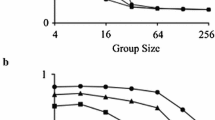Abstract
The theory of evolution has beenused in arguments regarding animalexperimentation. Two such arguments areanalyzed, one against and one in favor. Eachargument stresses the relevance of the theoryof evolution to normative ethics but attemptsexplicitly to avoid the so-called naturalisticfallacy.According to the argument against animalexperimentation, the theory of evolution`undermines' the idea of a special humandignity and supports `moral individualism'. Thelatter view implies that if it is wrong to usehumans in experiments, then it is also wrong touse animals, unless there are relevantdifferences between them that justify adifference in treatment. No such differencescan be found with regard to animals which lead`biographical lives'.The argument in favor of animal experimentationis based on evolutionary psychology. It statesthat humans, as all social animals, arespeciesist by nature and stresses that thisshould be taken seriously in normative ethics.This does not mean that animal interests shouldnot be considered, only that vital humaninterests may outweigh them.In order to assess the arguments, one has totake a stand on certain more basic issues: `is'versus `ought', impartiality versus specialobligations, and feelings/intuitions versusreason. Given the author's own position withregard to these more basic considerations, theevolutionary argument in favor of animalexperimentation is judged to be more convincingthan the one against but not decisive. It isalso maintained that not all animal experimentsare acceptable. Which animal experiments areacceptable and which are not has to be decidedon a case-by-case basis.
Similar content being viewed by others
References
Alexander, R.D.: 1987, The Biology of Moral Systems. New York: Aldine de Gruyter.
Arnhart, L.: 1998, Darwinian Natural Right: The Biological Ethics of Human Nature. Albany: State University of New York Press.
Bateson, P.: 1992, 'Do Animals Feel Pain?', New Scientist 134(1818), 30-33.
Buckle, S.: 1991, Natural Law and the Theory of Property: Grotius to Hume. Oxford: Oxford University Press.
Capaldi, N.: 1989, Hume's Place in Moral Philosophy. New York: Peter Lang.
Fetzer, J.H.: 1996, 'Ethics and Evolution', in: J.P. Hurd (ed.), Investigating the Biological Foundations of Human Morality. Lewiston: The Edwin Mellen Press, pp. 223-242.
Gruen, L.: 1993, 'Animals', in: P. Singer (ed.), A Companion to Ethics. Oxford: Blackwell, pp. 343-353.
Hume, D.: 1978, A Treatise of Human Nature. Oxford: Oxford University Press.
LaFollette, H.: 1993, 'Personal Relationships', in: P. Singer (ed.), A Companion to Ethics. Oxford: Blackwell, pp. 327-332.
Leahy, M.P.T.: 1991, Against Liberation: Putting Animals in Perspective. London: Routledge.
Midgley, M.: 1981, Heart and Mind: The Varieties of Moral Experience. New York: St. Martin's Press.
Midgley, M.: 1983, Animals and Why They Matter. Athens: The University of Georgia Press.
Orlans, F.B.: 1993, In the Name of Science: Issues in Responsible Animal Experimentation. Oxford: Oxford University Press.
Petrinovich, L.: 1998 (1995), Human Evolution, Reproduction, and Morality. Cambridge: The MIT Press.
Petrinovich, L.: 1999, Darwinian Dominion: Animal Welfare and Human Interests. Cambridge: The MIT Press.
Rachels, J.: 1989, 'Morality, parents, and children', in: G. Graham and H. LaFollette (eds.), Person to Person. Philadelphia: Temple University Press.
Rachels, J.: 1990, Created from Animals: The Moral Implications of Darwinism. Oxford: Oxford University Press.
Regan, T.: 1983, The Case for Animal Rights. Berkeley: University of California Press.
Rodd, R.: 1990, Biology, Ethics, and Animals. Oxford: Oxford University Press.
Singer, P.: 1975 (rev. ed. 1990), Animal Liberation. New York: Avon Books.
Wilson, E.O.: 1975, Sociobiology: The New Synthesis. Cambridge: Harvard University Press.
Wilson, J.Q.: 1993, The Moral Sense. New York: Free Press.
Woolcock, P.G.: 1999, 'The Case against Evolutionary Ethics Today', in: J. Maienschein and M. Ruse (eds.), Biology and the Foundation of Ethics. Cambridge: Cambridge University Press.
Author information
Authors and Affiliations
Rights and permissions
About this article
Cite this article
Nordgren, A. Animal experimentation: pro and con arguments using the theory of evolution. Med Health Care Philos 5, 23–31 (2002). https://doi.org/10.1023/A:1014267607898
Issue Date:
DOI: https://doi.org/10.1023/A:1014267607898




